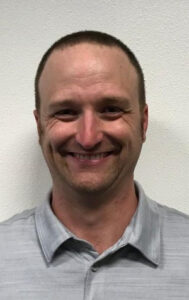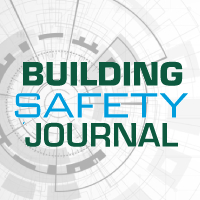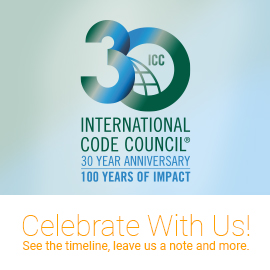
Master Code Professional AJ O’Connell
AJ O’Connell achieves the Master Code Professional designation, the gold standard of code certification
It’s considered the Ph.D. of building safety codes certification. The Master Code Professional (MCP) is the highest level of designation the International Code Council offers and is the “gold standard” for demonstrating proficiency in the code profession. The Code Council has certified thousands of individuals, but only a small select number have attained this high level of achievement: just over 800 MCP professionals worldwide. Their achievements are a benefit to the code enforcement profession as well as their communities.
To obtain this level of certification requires and demonstrates a commitment to the profession, diverse knowledge of codes and a high level of self-initiative. AJ O’Connell is the latest to join the elite group of Master Code Professionals. In this exclusive feature for the Building Safety Journal, we asked AJ to share his experience on obtaining the MCP designation, highlights of his professional career and any insights or advice he has concerning the industry.
AJ O’Connell
Building Official
City of Kingsburg
Kingsburg, California, United States
International Code Council member for six years
San Joaquin Valley
 BSJ: What led you to pursue and obtain MCP certification?
BSJ: What led you to pursue and obtain MCP certification?
O’Connell: After I was hired in my very first code professional job as a permit technician, I was encouraged by my jurisdiction’s plans examiner to obtain ICC certifications because it was a great way to learn the code. I only had a planning and zoning background through my college degree and previous work experience, so I didn’t really have a lot of familiarity with the codes. I took my mentor’s advice and got my permit technician certification, then my zoning inspector, then my residential building inspector… next thing I knew, I was only five or so certifications away from achieving the MCP. At that point, I was committed to making the code profession my long-term career, and having the MCP certification would be a great way to enhance that desire.
BSJ: How did you study and prepare for the many exams you took as a part of your MCP designation?
O’Connell: Every Thursday, after work, I would stay late at our city office and study, taking the commuter train home after dark when I was done many hours later. I also set aside a few hours every weekend to study at the dining room table, ensuring I had a quiet environment and space to spread out the many notes and books I had accumulated. I also made sure to sign up for as many ICC and CALBO training that I could to hear from the experts on test-taking strategies and code philosophies.
BSJ: What does achieving the prestigious MCP status mean to you?
O’Connell: For me, obtaining the MCP is simply a start. While the term “master” may be in the title, I see it as just a start to continue studying and understanding what the code means and how we can use the code to help the public. I make it a point to open the code book every day to research problems, even if I know the answer. The more we can understand the code as a living document, the better we can communicate its benefits to the public.
BSJ: How would you describe the value or benefits that have come with the recognition of your MCP status?
O’Connell: Since I didn’t grow up or develop in the construction and code industry, I think that obtaining the MCP is a benefit to show others — that may not have that background — that we’re a welcoming profession that is eager to train and mentor this often forgotten aspect of societal development. I have a degree in planning and worked in economic development, and I started my career as a permit technician. Now, I have the MCP. In order for us to continue to grow our profession, we have to show that people that may not have “grown up” in the industry can be successful and decorated if they work hard and commit to learning the code.
BSJ: What advice would you offer to those who are considering pursuing an MCP designation?
O’Connell: Your family is your biggest and best support network. I can’t even begin to convey how grateful I am to have a wife that supported me from the very beginning, was patient when I would come home on the train after midnight, and didn’t care if the dining room table was covered in notes and every I-Code you could think of. She supported me, was my cheerleader, and when I did achieve the MCP, celebrated as much as I did.
BSJ: How long have you been in the industry?
O’Connell: Six years.
BSJ: What major changes have you seen?
O’Connell: I’m so encouraged to see the building and safety industry fully embrace the role we’re playing in addressing climate change. We’re starting to be major players at the table for how to address this threat to our world, and the voices we have involved are committed to this. Especially here in California, I’m excited about the changes in the code that are making us energy independent and carbon neutral and encouraging alternative energy sources away from fossil fuels.
BSJ: What excites you about the future of your industry?
O’Connell: I like to think that the building and safety industry is becoming customer-focused and driven. That has allowed us to better convey our important role in public safety. We’ve emphasized customer service as a tenant in our industry and people are seeing us as partners. It’s better to achieve our goals in safety as partners with the public than as adversaries.
BSJ: What is one piece of advice that you would give to those starting out in the industry?
O’Connell: We’re an industry that embraces new blood, and new ideas, and are willing to pass on what we know! If you have a commitment to helping others, making our world safer, and being a change agent, you’re in the right field!
BSJ: Building safety is the focal point of our mission here at the Code Council. What is the importance of building safety to you? How has ICC helped you in your career and commitment to public safety?
O’Connell: Being a California resident, we have to always be ready for natural disasters. Whether it is earthquakes or wildfires, our built environment can give us a distinct advantage over Mother Nature when she decides to unleash these events upon us. Building codes are what give us that modicum of safety. It allows us to develop the world we love. Organizations like ICC empower and encourage professionals in this field.
BSJ: Obtaining all those ICC certifications is quite an accomplishment. What are you going to do now that you have achieved this goal?
O’Connell: Take a deep breath, drink a beer, and focus on what to study for next!
BSJ: Thank you, AJ, and congratulations. You have definitely been an encouragement to us all in your pursuit of excellence.
To earn the Code Council’s elite MCP designation, a candidate must first pass 10 core Code Council exams plus a number of elective Code Council exams. Typical Master Code Professionals hold 17 or more Code Council certifications. The Master Code Professional designation requires certified individuals to complete an additional 60 hours of Continuing Education Units every three years to maintain active status.
“The Master Code Professional certification is the pinnacle of all Code Council certifications, representing a level of effort, knowledge, and dedication that elevates not only the individual achieving it but the code official profession as a whole,” said Code Council Chief Executive Officer Dominic Sims, CBO.
Master Code Professionals are typically responsible for all technical and management aspects of code enforcement with duties that range from the management of a code enforcement department to the supervision of inspectors and plan reviewers.
“Congratulations to AJ on achieving this important and significant accomplishment,” said Autumn Saylor, Director of the Code Council’s Assessment Center. “I challenge and encourage all code professionals to strive for this level of achievement, and look forward to congratulating more Master Code Professionals in the future.”
To learn more on how you can join this elite group and let us help you open the door to increased professional challenges and career advancement, click here.





